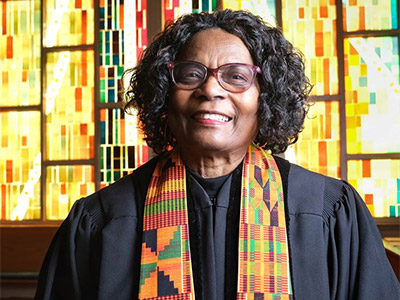Alum Writes about the Struggles of Black Women in Ministry
The Rev. Dr. Josephine Whitely-Fields ’79, is the author of Pioneer Black Clergywomen. The book chronicles the stories of nine Black pastors in The United Methodist Church who persevered through the racism, sexism, and ageism prevalent in a vocation that is so predominantly white and male.
While each person’s calling to ministry is unique, Josephine sees common threads connecting the callings of Black clergywomen—including her own.
Josephine was dedicated to her studies in dental school when that calling first appeared. While serving patients in underserved populations, it occurred to her that while the people did need dental care, there was something they needed more: God’s love. As strong as this new passion felt, Josephine did not like it! After all, she was in dental school—a fact that was not only meaningful in its own right, but which served as the capstone of her fight for freedom in the civil rights movement. After working from childhood to help integrate schools in her home state of West Virginia, she was now just the third Black woman to attend her dental school.
“I had never even seen a woman in ministry before,” Josephine explains. “I didn’t want to take on an entirely new fight for freedom. So, I flat-out said no to God.”
This is one of the common threads Josephine has seen in Black women’s ministry callings: because circumstances have so often stood in the way of their paths to ministry, God does remarkable things to help them along. For Josephine, who was continuing to delay and negotiate with God, the remarkable moment came after she was diagnosed with a tumor.
Her excruciating pain led her to fast and pray, and during these practices, she realized she was trapped in a materialistic mindset and was far from God. Then, at a worship service, Josephine was completely healed of the tumor when others anointed her with oil and laid hands on her. Josephine decided it was time to respond to God’s call to outreach ministry.
Later, when ordained pastoral ministry came into focus as her calling, she obtained a master’s degree from PTS. After ordination, she served in The United Methodist Church, where she pastored churches in three states and directed missions and outreach for the Western Pennsylvania Annual Conference. Josephine also received a PTS Distinguished Alumna Award.
Josephine’s 40 years in ministry featured many of the themes that surfaced in her study of Black clergywomen. Struggles (“There are always struggles,” she notes) required her to work through her Christian faith in tangible ways. Suffering drove her to her knees in prayer and dependence on God. She learned the importance of building strength of character. Like the other women she wrote about in her book, Josephine did not react to her hardships with bitterness or resentment, but with love and forgiveness.
While Josephine has retired from parish ministry, she continues to follow God’s will one day at a time. This is what led her to write—a sense of calling from God to document the legacy of women of color and their ministries. But this project was never just about the past. Black clergywomen’s struggles continue. So does their holy work.

